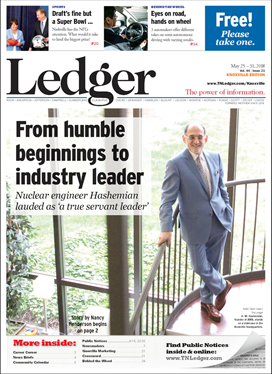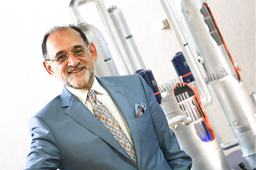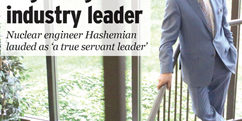[scf-post-title]
 H.M. “Hash” Hashemian was working on a project while earning his master’s degree in nuclear engineering at the University of Tennessee when he and his professor, Tom Kerlin, realized they had the makings of a solid commercial enterprise.
H.M. “Hash” Hashemian was working on a project while earning his master’s degree in nuclear engineering at the University of Tennessee when he and his professor, Tom Kerlin, realized they had the makings of a solid commercial enterprise.The invention, which measured how quickly a sensor could alert engineers to a critical temperature change in a nuclear reactor, sparked the 1977 launch of the Knoxville-based Analysis and Measurement Services Corporation, which now provides equipment, training and testing services to nearly every nuclear power plant in America and others in Europe and Asia. The global leader also performs high-tech research and development for the U.S. Department of Energy, U.S. Nuclear Regulatory Commission, U.S. Department of Defense, NASA, U.S. Navy and U.S. Air Force, as well as utilities, manufacturers and vendors.
The man behind AMS is widely respected in his industry and not just for his career accomplishments, which include 21 patents (15 awarded and six pending); three books; multiple industry honors; frequent international lectures; and sought-after expertise in peaceful applications of nuclear energy to generate electricity and diagnose and treat medical conditions. He has also earned a reputation as a compassionate, generous volunteer in his field and an employer who treats his staff members like family.
“Hash is a true servant leader,” says Wes Hines, Postelle professor and head of the UT nuclear engineering department, who’s known Hashemian for more than 20 years and did some work for AMS as a young assistant professor.
“He is highly regarded as someone who will not only get results, but also his output will be of exceptional quality. This has facilitated his success in the nuclear industry where attention to detail and safety is paramount.”
Hashemian, whose self-effacing sense of humor often surfaces in conversation, describes his childhood in Iran as happy, energetic and positive. He loved to make his mom laugh and admired his well-known father, a human rights and criminal defense attorney. “We were not very rich, but we were OK,” Hashemian, 67, recalls.
A few months after earning his B.S. in physics from the National University of Iran in 1973, 24-year-old Hashemian joined his brother in Texas, where he studied electrical engineering for less than a year before transferring to the master’s program at UT and switching to nuclear engineering. Two factors compelled him to make the move, he says: UT’s proximity to the Oak Ridge National Laboratory, which aligned with his interests, and the fact that his mother’s sister, a biologist, was working there as a cancer researcher.
“Iran had a great relationship with the United States and was going to purchase and install a bunch of nuclear power plants, so I decided that would be a good thing to study because Iran would need it,” he says.
Hashemian never returned to his native country.
 By the time he finished his master’s degree, the new Iranian regime had put the brakes on the nuclear power program. Hashemian considered a job offer in France but decided to go with his instincts and build his own company from the ground up while working as a UT teaching and research assistant making $200 a month and sharing expenses with an “equally poor roommate.” Hashemian and Kerlin, his professor-partner, had just enough money to hire a lawyer and draw up the paperwork.
By the time he finished his master’s degree, the new Iranian regime had put the brakes on the nuclear power program. Hashemian considered a job offer in France but decided to go with his instincts and build his own company from the ground up while working as a UT teaching and research assistant making $200 a month and sharing expenses with an “equally poor roommate.” Hashemian and Kerlin, his professor-partner, had just enough money to hire a lawyer and draw up the paperwork.But Hashemian was determined not to lean on his family.
“I didn’t ask for money from them because when I came to the United States, I found out everybody is on his own after they’re 18 years old,” he recalls. “So, I thought, ‘I will be that, too.’ So, I told my parents I was going to make it on my own. And they would brag to their friends, ‘Hey look, my son doesn’t want any more money. He’s already mature.’”
Hashemian’s big break came early on. Not long after the formation of AMS, the company won a $15,000 contract. “That was probably equal to $15 million dollars today,” Hashemian muses. “That was a lot of money, and that got us started.”
Success hasn’t always come easy, though. Hashemian points to highly publicized nuclear accidents at Three Mile Island, Chernobyl and Fukushima, all of which delivered blows to his industry. Each time, however, business picked back up.
“I don’t give up, so as these things happened we started expanding to countries that actually are growing in nuclear power, such as China,” he adds. “I’ve always been lucky. Things happen in life – I’ve had some of those just like everybody else – but the business has always been good. We are very happy and profitable, and for what my capabilities are, I think we’ve done well. I have cousins that have done 100 times better than me, but they’re also 100 times more capable.”
The decade between 2000 and 2010 was his most productive so far, he points out. During that time, he wrote two of his books on nuclear power plant methods, both translated into Chinese, Japanese, Korean and Russian; earned a trio of doctorates in three different countries; and, against the odds, built the perfect house with his wife Nazzy. “My wife and I do not agree on anything,” he says with a laugh.
“And if you think about that, building your house together is the worst thing you can do. But we were able to do it, and that was a major accomplishment.”
His strong point in business, he says, is his hardworking nature. “Otherwise, I probably have no other talent,” he jokes, then adds with more seriousness, “I’m proud of my ability to actually stay on top of the science and technologies of nuclear power.”
Hines describes his friend as “humble,” an adjective that elicits a chuckle from Hashemian. “My family thinks I’m not humble at all. My daughter says, ‘Dad is there one day that goes by that you don’t talk about yourself?’ But I’m glad other people think I’m humble.”
Modesty aside, Hashemian agrees with his buddy about one thing: He loves to have fun. In fact, he enjoys nothing more than to throw a party and entertain guests at his home.
 One weekend he might be leading a committee on nuclear reactor safety in Vienna; the next, he’s attending a Bonnaroo concert with his daughter Nikki, who is following in her grandfather’s footsteps, studying at Nashville’s Belmont University College of Law and interning with Sen. Lamar Alexander this summer. Hashemian’s son Alex, a mechanical engineer, joined AMS four years ago.
One weekend he might be leading a committee on nuclear reactor safety in Vienna; the next, he’s attending a Bonnaroo concert with his daughter Nikki, who is following in her grandfather’s footsteps, studying at Nashville’s Belmont University College of Law and interning with Sen. Lamar Alexander this summer. Hashemian’s son Alex, a mechanical engineer, joined AMS four years ago.Hashemian and his spouse are also very active in the community, supporting various charities, including East Tennessee Children’s Hospital. More recently, he has opened his home to receptions and fundraisers for local political candidates, something he started, he says, while campaigning for his friend and gubernatorial contender Randy Boyd.
Last year, Hashemian was named to the U.S. Department of Commerce Civil Nuclear Trade Advisory Committee, established in 2008 to advise the department on ways to make the U.S. nuclear industry more competitive. He consults alongside executives from much larger companies such as Westinghouse and General Electric.
“That is very important right now to the United States, because the United States is the mother of all nuclear power technologies. But because of the economics of nuclear power, this industry is not drawing in the United States,” he acknowledges.
“It’s pathetic that the United States is not able to sell this to other countries. The U.S. has sold maybe four, but we are way behind Russia. We’re getting behind other countries, like China.”
Each quarter, Hashemian says, CNTAC members get together to brainstorm on strategies for increasing the nation’s share of the nuclear technology market. He cites one example in which his group convinced the U.S. secretaries of Commerce and Energy, along with the president, to push to get the U.S. on the list of bidders when Saudi Arabia announced plans to buy a nuclear power plant.
Hashemian also serves as an adjunct professor in the UT nuclear engineering department, mentoring students who look up to him as a role model for their aspiring careers. His favorite award – and there are many – was the UT Alumni Professional Achievement Award he received in 2012, the same year the late Pat Summitt got one too.
“I went for the party with my children, which was good because it is very, very hard to impress my family,” he quips. “I was proud of that one. So, I bragged and every time my children say, ‘Well Dad, you’re not really …,’ I say, ‘Look, I’ve got the same award in the same ceremony as Pat Summitt, so shut up.’”
Hashemian has also received major kudos for establishing Systers, a UT campus organization that seeks to recruit, mentor and retain women in electrical engineering and computer science. He still offers financial support but has since turned the group over to Nazzy, where “it has formed a life of its own.” Systers was featured in a 2015 USA Today article on Facebook’s Sheryl Sandberg and her Lean In movement.
So why would a man in what has traditionally been a man’s industry go out of his way to advance female engineers?
“My dad was also very much into women’s causes,” Hashemian explains. “He was a fantastic women’s rights lawyer and fought with men for women and their rights and made a lot of difference. So maybe there’s a little bit of that. But the real reason is this: We don’t have enough females in engineering.
“Females are better,” he continues. “My wife is probably the best engineer I’ve ever seen, and she’s not an engineer. But she’s 10 times better than me. She can figure stuff out that I can never figure out, and simple things. She’s a very good engineer, and so are most other women that I know, but we don’t have enough of them coming to engineering, and that’s a pity.
“That’s really horrible. The reason for that is because for some reason, historically probably, women feel like they’re not good at math and physics, and that’s not true at all. But the ones who come find out that they’re a lot better than guys.”
To young engineers just starting out, Hashemian urges, “Keep up with what’s going on both in advances in technology and the business side of the industry, because if you’re in this field and you do not know what’s going on, you may find yourself losing a huge opportunity.”
But his biggest piece of advice stems from his own rags-to-riches journey. “I always tell people: I came from another country. I’m a foreign guy here. It’s a privilege to be a citizen of the United States, obviously. But I think what made it for me, if you consider me successful, was nothing but just working hard. Here it is really the land of opportunity because nothing else matters. You don’t have to be well-connected or even super smart. If you work pretty hard, and be honest, and stick to the basics, and follow the laws and rules, sooner or later you’re going to get somewhere.”
Article by Nancy Henderson, courtesy the Ledger – The Knoxville Edition.








